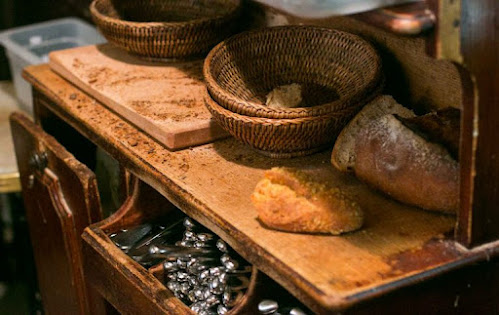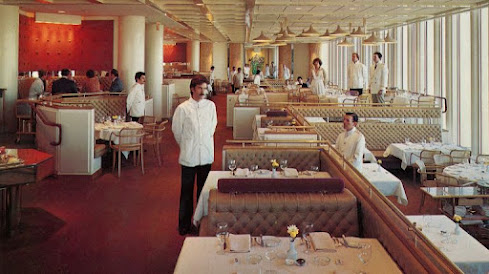It's New Year's Eve, the ultimate celebration night. It is always super busy in the restaurant business. In our restaurants, we referred to it as 'Amateur Night'. If a person only went out one night a year, this was it. They always overindulged and usually made fools of themselves. Celebration always brings up thoughts of Champagne, not sparkling wine but true Champagne from the Champagne region of France. When I think of Champagne, I always think of Claude Taittinger.
After the repeal of Prohibition in the United States, a three-tier system of alcoholic beverage distribution was set up. These three tiers are producers or importers, distributors and retailers. When I started in the wine business, I went to work for Mr. Frank Stone at Empire Distributors in Atlanta. I started as a sales representative. I must tell you that I was always much better at consuming alcoholic beverages than selling them. I was never really a people person. You have to be a people person to be good at selling.
I have been lucky. I have worked in all three tiers of this system at one time or another. I worked for Winebow Inc. which was an importer. Empire which was a distributor and I have held retail liquor licenses in the different restaurants I have owned.
While with Empire Distributors, I advanced into management. I became the on-premise fine wine manager for Atlanta. I worked with Frank Stone, in dealing with the different producers and importers that we represented in the state of Georgia. We set up sales programs, pricing and liaisons with the wine shops and restaurants in our market.
In addition to Georgia, Empire owned distributor houses in North Carolina, one in Wilmington, one in Raleigh, one in Charlotte and one in Asheville. The North Carolina houses represented a different set of producers and importers than in Georgia. At one point, Empire was having some problems in North Carolina so the owner sent Frank and myself up to solve them. I eventually became the state fine wine manager for North Carolina and traveled between the different houses educating their sales forces on the different fine wines in their portfolios.One of these importers was Kobrand Corporation. It is headquartered in a midtown Manhattan townhouse in New York City. It is a privately owned marketer of wines and spirits and serves as the exclusive agent for many fine European wines. Kobrand also owns many of the brands in their portfolio. They also represents brands from outside of Europe. All total, they have a large list of brands that they market in the United States.
Kobrand operated a week-long wine education course out of that townhouse for their different state distributor partners. I was invited to attend the course as the representative from Empire in North Carolina. This was back in 1997. I'm not sure that they still do this. There were about 40 of us from all over the country. We were housed in nearby hotels and classes started promptly at 8:00 in the morning. There was a break for lunch which always included a food and wine pairing, then we had afternoon classes. After class, there was a small break and then dinner out as a group with more food and wine pairings. It was quite intense.
The classes included a lesson in blind tasting wine and lessons on all the different countries' wine regions. This only included the countries where Kobrand had brands. Of course, we were also educated on the wineries and distillers Kobrand represented. Kobrand had its own educator and he traveled the country working with the different distributors sales forces on these particular countries and products. He led most of these classes but they also had representatives of different wineries (winemakers,sales managers or owners) conducting some of the classes.
On the third day, for the afternoon session Mr. Claude Taittinger taught the course on Champagne. He stood at the back of the room and was introduced. As he made his way up to the lectern, he stopped at each person and asked their name and shook their hand. He actually kissed the ladies' hands. He's French. He gave an impressive lecture on the history and particulars of the Champagne region of France. It included the history of his champagne house and a tasting of his different cuvees. I was impressed, as was everyone else. As he left the room, he again shook or kissed everyone's hand and called them by their name. He had remembered everyone's name. I'm sure he had probably met some of these people before, but not all 40. I was astounded.
Claude Taittinger died in January of 2022 at 94, a few days after New Year's Eve. He was a remarkable man who ran Champagne Taittinger for nearly 50 years. He was the ultimate bon vivant and an astute businessman. He started in the family business at age 22 and was 24 when he came to the United States representing the family to negotiate the distribution partnership with Kobrand. During his tenure, he increased the number of family owned vineyards to 712 acres, increase production from 85,000 cases to over 410,000 cases per year. He also modernized the marketing of champagne as a luxury product. In addition he managed the other family businesses such as the Concorde Hotels and Baccarat Crystal. He was born into wealth and with his business acumen he greatly increased it.
Mr. Taittinger was always an ambassador for the Taittinger brand. He was a gourmand and a patron of the arts. He established the Pierre Taittinger International Culinary Award to recognize talented young chefs. He developed the Taittinger Collection which featured works of art by contemporary artist like Roy Lichtenstein and Andre Masson on bottles of Taittinger.
The third night was a free night for all the students of this wine course. There was no planned function. I have always been a fan of Broadway. Any trip to New York, in addition to restaurants has included at least one show. The musical 'Rent' had just opened and had received a lot of press. I was going to forgo a great dining experience for a great theater one. I don't know if the show's themes of love, friendship and artistic expression wasn't appealing to my fellow students. Or if the addressing of the social issues of HIV/AIDS, LGBTQ+ rights and poverty turned them off. For whatever reason I couldn't get anyone else interested in going with me. I have never been afraid to "go it alone" so I did. Everyone else went to clubs and restaurants and I went to the theater. Because of my solo status, the ticket I procured was center orchestra 5 rows back from the stage, a prime seat.
Will I Lose My Dignity?Will Someone Care?Will I Wake TomorrowFrom This Nightmare?
Seasons Of Love
Five hundred, twenty five thousand, six hundred minutesFive hundred, twenty five thousand moments so dearFive hundred, twenty five thousand, six hundred minutesHow do you measure, measure a year?In daylights, in sunsetsIn midnights, in cups of coffeeIn inches, in milesIn laughter, in strifeIn five hundred, twenty five thousand, six hundred minutesHow do you measure a year in a life?How about love?How about love?How about love?Measuring loveSeasons of loveSeasons of love
Five hundred, twenty five thousand, six hundred minutesFive hundred, twenty five thousand journeys to planFive hundred, twenty five thousand, six hundred minutesHow can you measure the life of a woman or a man?In truths that she learnedOr in times that he criedIn bridges he burnedOr the way that she diedIt's time now to sing outAlthough it's not the endTo celebrate, remember a year in the life of a friendRemember the loveRemember the loveRemember the loveMeasuring the seasons of loveSeasons of love















.JPG)
























